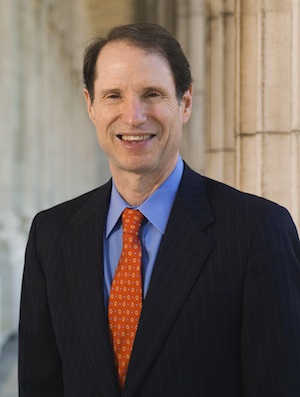
Sen. Ron Wyden (D-OR) delayed the PROTECT IP Act in the Senate by placing a hold on the legislation last year. That hold kept the bill from coming to the consideration of the full Senate after it was unanimously voted out of the Judiciary Committee—and gave time for the Internet to rally against it. The delay proved useful; Senate Majority Leader Harry Reid (D-NV) today canceled a planned vote to end Wyden's hold, one scheduled for next Tuesday. PROTECT IP appears, in its current form, to be dead.
I spoke to Wyden yesterday about his opposition to the bill, and about his strategy for moving forward.
Preventing the bill's progress next Tuesday was a key goal, since it might allow for "a real and enduring agreement that allows for us to fight copyright infringement without damaging the Internet." Had the vote taken place on Tuesday, PROTECT IP proponents would have had tremendous power to shape the final bill before seeking its passage. (While changes have been promised, they have yet to be made.)
"We gotta win this to get the Senate to step back and have a more thoughtful discussion with all sides represented," he said. "You can't come up with sensible Internet policy on the fly."
Wyden attributes the growing resistance to PROTECT IP and its House companion bill, SOPA, to Internet organizing. Wednesday's protests against the bills (in which Google, Wikipedia, Ars Technica, and other sites took part) was "a day for the history books," Wyden said, one that will "change permanently the way citizens communicate with their elected officials."
Washington processes—such as the initial drafting of legislation—are far from transparent. Couple that with the fact the Senate Judiciary Committee could unanimously and "with almost no discussion" pass something as flawed as PROTECT IP, and you have a recipe for voter anger at the way Washington works.
The challenge now is to "make sure that the outpouring of concern is translated into results," Wyden said. One key goal: bringing a measure of transparency, sanity, and expert advice to the drafting and hearings process around such legislation. (Good luck with that!)
Despite the strongly partisan nature of contemporary politics in Washington, Wyden remains an optimist. "It's possible to do it in a way that leaves a more inclusive kind of process and produces a better piece of legislation because all sides learn from each other," he said.
As for his own alternative bill, the OPEN Act, Wyden said he's going to walk the talk. "We're prepared to take the time to do this right," he said. "We don't need to pass the bill in the next 15 minutes.
Listing image by Photograph by JD Lasica
reader comments
44